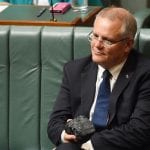Around The Web
The second wave of worldwide climate protests – in pictures
Hundreds of thousands of people around the world are taking part in the latest wave of climate strikes to demand urgent action on the emergency
Continue reading...China set to drop absolute emission cap on ETS, says government advisor
'Alarming' extinction threat to Europe's trees
More than half of native European trees face extinction, warns study
Ash, elm and rowan among trees threatened by pests and pollution, says biodiversity report
More than half of Europe’s endemic trees are threatened with extinction as invasive diseases, pests, pollution and urban development take a growing toll on the landscape, according to a study.
Ash, elm and rowan trees are among those in decline, says the assessment of the continent’s biodiversity, which could complicate efforts to tackle the climate crisis through reforestation.
Continue reading...'There are a million things governments can do': readers' global climate strike photos
With more strikes planned this Friday, we look at readers’ suggestions on how those in power can tackle the climate crisis
Continue reading...SK Market: KAUs climb higher as sellers maximise profits from compliance laggards
Fresh wave of climate strikes takes place around the world
Hundreds of thousands hit streets across continents to demand action on climate
Hundreds of thousands of people around the world are taking place in the latest wave of climate strikes to demand urgent action on the escalating ecological emergency.
Last week, millions walked out of schools and workplaces, uniting across timezones, cultures and generations in the biggest climate protests in history before a special UN conference in New York.
Continue reading...2019 Finalised Priority Assessment List
I didn't ask him to write a book: Scott Morrison defends drought envoy Barnaby Joyce
Prime minister says Joyce has done his job as he announces a further $100m in drought funding
Scott Morrison has defended Barnaby Joyce’s performance as his drought envoy, saying he was not asked to “write a book”, but provide “candid feedback” and any criticism was from people caught up in “semantics”.
Morrison, who hopped off the plane from the United States following his official visit and on to another one to visit a drought-stricken Queensland community to announce a further $100m in drought funding, said Joyce had done his job and the issue had been “over-analysed”.
Continue reading...UK roadsides on verge of becoming wildlife corridors, say experts
New guidelines could save councils money and lead to 400bn more wildflowers
Britain could enjoy 400bn more flowers if road verges were cut later and less often according to guidelines drawn up by wildlife charities, highways authorities and contractors.
The national guidance for managing roadside verges for wildflowers calls for just two cuts a year – instead of four or more – and only after flowers have set seed, to restore floral diversity and save councils money. It would also provide grassland habitat the size of London, Birmingham, Manchester, Cardiff and Edinburgh combined.
Continue reading...‘Swampy symbiosis’: fossil fuel industry has more clout than ever under Trump
Lobbyists are giving millions to help Trump win in 2020, after reaping a regulatory windfall that benefited their bottom lines
Robert Murray, a coal magnate who forged ties in 2016 with Donald Trump as he championed reviving the beleaguered coal industry, hosted a fundraising dinner this July in West Virginia that hauled in an estimated $2.5m for the president’s re-election coffers.
Texas lobbyist Jeff Miller, who has several big fossil fuel clients and ran energy secretary Rick Perry’s 2016 presidential campaign, raised about $1m in this year’s second quarter for the Trump Victory Committee, campaign filings show.
Continue reading...Chandrayaan-2: India Moon probe made 'hard landing', says Nasa
Italian minister urges pupils to skip class for global climate strike
Education minister from new coalition says schools should see absences as ‘justified’
Young environmental activists in Italy are planning to miss school as thousands join climate crisis protests in major cities on Friday.
Some 475,000 people took part in the first global climate strike in Italy on 15 March and a similar number are expected to join the latest demonstrations in cities including Rome, Milan, Turin, Florence, Naples, Bologna and Bari. But only if they are allowed to skip school. Earlier this week the education minister, Lorenzo Fioramonti, urged schools to consider as “justified” the absence of children taking part in the mobilisation against the climate emergency.
Continue reading...Minerals Council of Australia makes global top 10 climate policy opponents
 Minerals Council of Australia - with deep ties to Morrison government - gets number eight global ranking for groups acting against climate policies.
Minerals Council of Australia - with deep ties to Morrison government - gets number eight global ranking for groups acting against climate policies.
The post Minerals Council of Australia makes global top 10 climate policy opponents appeared first on RenewEconomy.
The Driven Podcast: What does the grid operator want to do with electric vehicles?
 AEMO is looking at how electric vehicles fit into the grid. AEMO’s Greg Staib even imagines them used as batteries at peak times. Pity if you are trying to flag down a share car at the same time.
AEMO is looking at how electric vehicles fit into the grid. AEMO’s Greg Staib even imagines them used as batteries at peak times. Pity if you are trying to flag down a share car at the same time.
The post The Driven Podcast: What does the grid operator want to do with electric vehicles? appeared first on RenewEconomy.
Oil drilling in the Bight will signal an unsustainable future for humanity
 Chief scientist delivers report into reviews of oil development in the Great Australian Bight. But he wasn't asked to consider climate change.
Chief scientist delivers report into reviews of oil development in the Great Australian Bight. But he wasn't asked to consider climate change.
The post Oil drilling in the Bight will signal an unsustainable future for humanity appeared first on RenewEconomy.
The showy everlasting is endangered, but a primary school is helping out
Lessons for a destabilising planet: insights from the 2009 South Pacific earthquake-tsunami disaster
AEMO warns of added costs and delays to new solar projects in Victoria, NSW
 AEMO warns of added costs and potential delays for new projects as it delves deeper into system strength issues that have already imposed limits on five major solar farms.
AEMO warns of added costs and potential delays for new projects as it delves deeper into system strength issues that have already imposed limits on five major solar farms.
The post AEMO warns of added costs and delays to new solar projects in Victoria, NSW appeared first on RenewEconomy.
Synergy blames solar for huge loss, but embraces renewable future
 Western Australia’s state owned electricity generator and retailer Synergy has named the booming rooftop solar market as a key factor behind a huge loss and asset write down revealed by the government-owned company for the last financial year. In its FY2018-19 Annual Report, Synergy says the net loss of $657 million – including a $428.9...
Western Australia’s state owned electricity generator and retailer Synergy has named the booming rooftop solar market as a key factor behind a huge loss and asset write down revealed by the government-owned company for the last financial year. In its FY2018-19 Annual Report, Synergy says the net loss of $657 million – including a $428.9...
The post Synergy blames solar for huge loss, but embraces renewable future appeared first on RenewEconomy.



